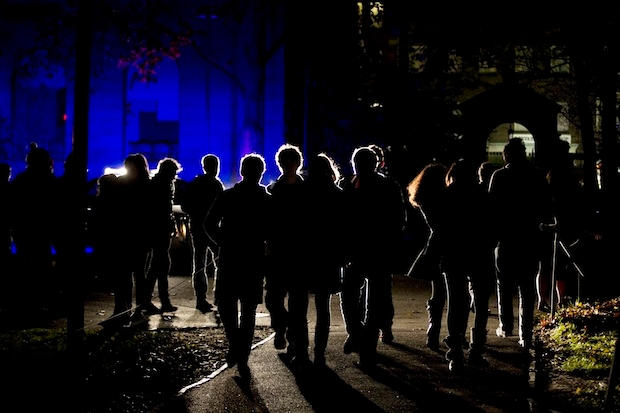‘We need successful energy companies in Britain, we need them to invest for the future,’ said Ed Miliband in his conference speech, as though channelling my thoughts at the very moment I was writing last week’s item on the lack of a national energy strategy. Then he ruined it: ‘If we win the election, the next Labour government will freeze gas and electricity prices until the start of 2017. That’s what I mean by a government that fights for you.’
And that’s what we all mean by politicians making ill-conceived promises for short-term gain. George Osborne’s response? ‘Any politician would love to tell you that they can wave a magic wand and freeze your energy bill… Companies would just jack up their prices before the freeze… And companies would not invest… and build the power stations we need — so in the long term, prices go up. That’s Labour’s offer: get hammered with high prices now, get hammered with high prices later… But don’t worry, there’s a phony freeze in between.’
Of course Osborne understands the need for investment in gas and nuclear generating capacity, but like Miliband his priority is to win votes — hence his half-promise to freeze fuel duty for the rest of this parliament. To find out whether anyone is really focused on the looming energy crisis, we have to return to the Lib Dem conference in Glasgow and force ourselves to listen to Ed Davey, who holds the coalition’s energy and climate change portfolio. And yes, it’s a tedious mishmash of eco-bollocks about ‘green growth’ and ‘the battles I fight over wind power’, combined with a sideswipe at his cabinet colleague Owen Paterson for ‘culling wind turbines faster than he can cull badgers’. Not one of this trio offered a hint as to how we’re going to keep the lights on. But at least Miliband gave us a useful new cliché: can’t Britain do better than this?
Another challenger
This has turned into a good season for bank history buffs, of whom I may well be the only one in the national press. The rebirth of the Trustee Savings Bank is to be followed by the relaunch of Williams & Glyn’s — a brand that disappeared inside Royal Bank of Scotland in 1985, having been created 15 years earlier by the merger of two venerable RBS subsidiaries, Williams Deacon’s of Manchester and Glyn, Mills & Co of London. The name has been attached to a ‘challenger bank’ that is to be spun out of RBS with the Church Commissioners as a shareholder, appropriately high ethical aspirations, and plans for flotation in 2015. Its 300-odd branches will be concentrated in the north-west, where Williams Deacon’s (incorporating the Manchester & Salford Bank) was once a familiar high-street name.
The more challenger banks with roots and ethics, the better. And I hope this one also reconnects with the spirit of Glyn, Mills, which had a reputation before and after the second world war as a progressive institution that was a meritocratic nursery for future City high-fliers. Among its alumni is Sir Jeremy Morse, the chess-playing Wykehamist and fellow of All Souls who went on via the Bank of England and the IMF to become chairman of Lloyds. It was in that capacity, at the height of the 1980s credit boom, that he told a television interviewer he thought it ‘wrong for individuals to borrow’, never having done so himself. They should invite him back to chair the risk committee.
I note, incidentally, that even the ultra-respectable Glyn, Mills hesitated before publishing its bicentenary history in 1953 lest ‘evil-minded persons… make it the occasion for an onslaught on the iniquities of the banker’. Funny how there are always people who want to do that.
Unthinkable?
Funny also how everyone you once met eventually pops up again in a new guise. I’ve just read a glowing profile of Arnold Donald, who has taken the helm of Carnival, the cruise-ship operator that owns the ill-fated Costa Concordia. A native of New Orleans, he is only the second black chief executive of a FTSE 100 company (the first was Thiam Tidjane of Prudential) and he’s clearly an upstanding corporate citizen. But when I knew him in the 1990s he was a rising star of Monsanto, the bioscience giant which pioneered genetically engineered seeds, synthetic cattle hormones and other sinister-sounding modifications of nature.
The talk in those days was of ‘terminator’ plants bred in laboratories to produce sterile seeds — forcing farmers to buy new seed every year. That never happened (Monsanto pledged in 1999 not to commercialise the concept) and I recall Donald waxing eloquent about many other benign but misunderstood possibilities of GM science. Now his job is to talk up Carnival after the capsizing of Costa Concordia, so you could say he’s moved from the almost unthinkable to the not quite unsinkable.
A place to linger
I recommend a visit to King’s Cross Square, the piazza in front of the station that was officially opened last week to complete a £550 million regeneration and complement the handsome 1852 frontage designed by Lewis Cubitt. Blending good contemporary design with conservation overseen by hawk-eyed heritage police, the King’s Cross-St Pancras complex is now ‘a destination in its own right’, as Transport Secretary Patrick McLoughlin said at the ceremony — and I find it so pleasing that I linger there mid-journey in a way that would have got me arrested in the stations’ darker days.
The British attitude to infrastructure investment is so hesitant and pessimistic that we need reminders like this of how good it can be. It’s a pity we can’t stage the Spectator HS2 Debate (31 October) in the spectacular western concourse of King’s Cross. Come to think of it, it’s a pity HS2 isn’t designed to terminate at King’s Cross or St Pancras instead of brutalist, badly connected 1960s Euston. It might make the less ardent antis start to think positive.







Comments